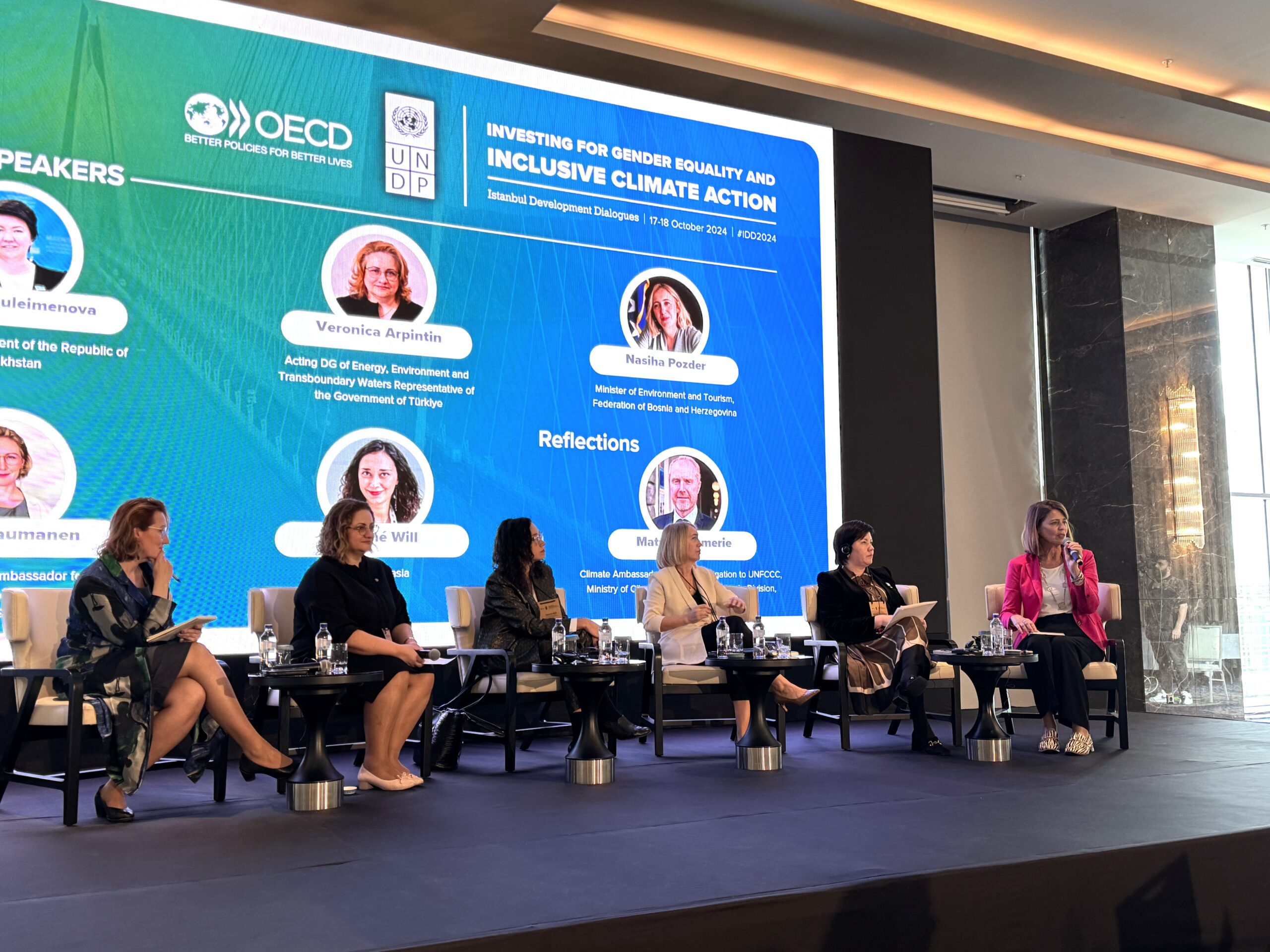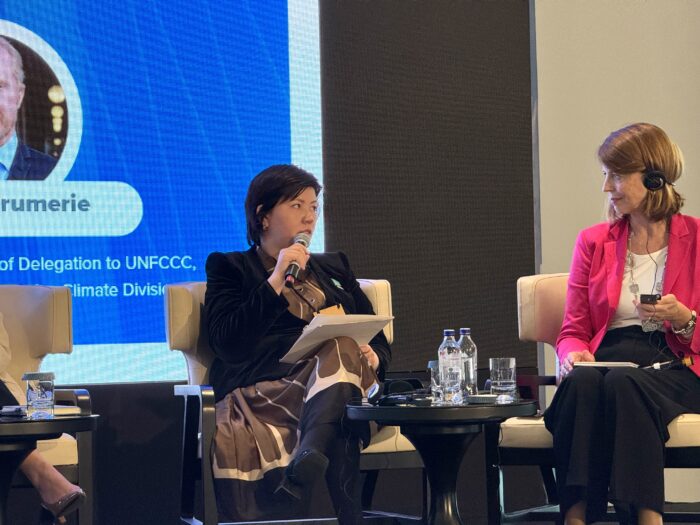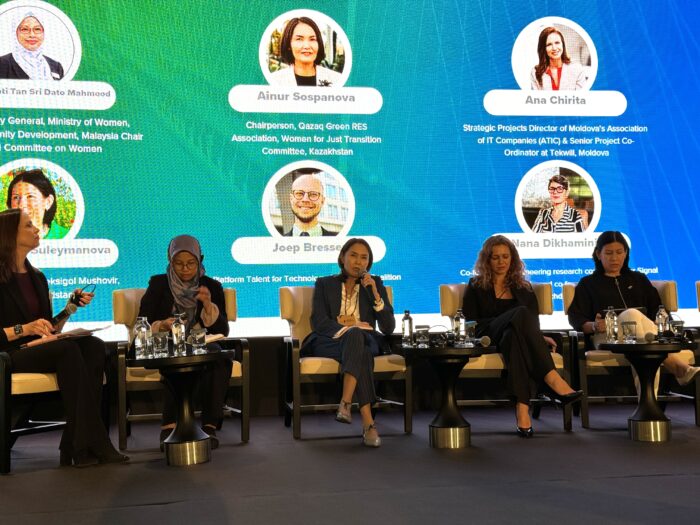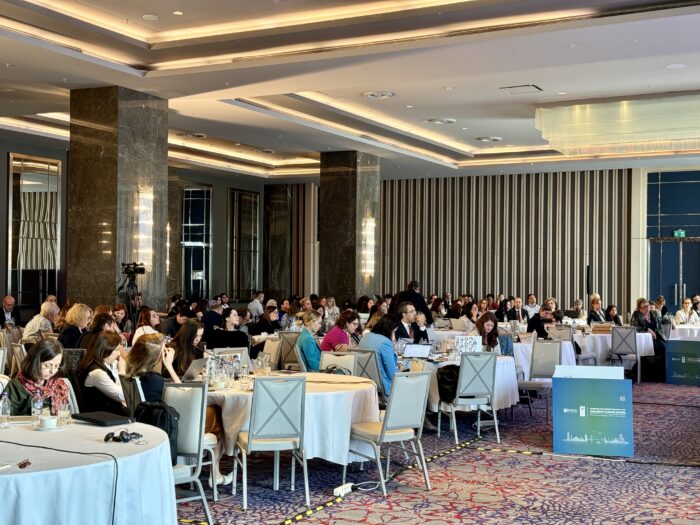ISTANBUL – The Kazakh delegation participated in the Istanbul Development Dialogue event on Oct. 17-18, which called for increased investments in gender equality and inclusive climate action. They shared the challenges Kazakhstan faces towards gender equality and the measures it has undertaken so far.

Zhuldyz Suleimenova (second from the right) addressed the panel session at the Istanbul Development Dialogue. Photo crediti: Assel Satubaldina/ The Astana Times
Addressing the panel session, dubbed Women’s Leadership for Just Transition and Inclusive Climate Action, Zhuldyz Suleimenova, a Mazhilis deputy, a lower chamber of the Kazakh Parliament, said while diversifying the energy mix is a priority of Kazakhstan, the country’s economy is still heavily reliant on coal, with 60% of its energy derived from coal sources, making the transition to a green economy a gradual process.
“There is a growing investment in renewable energy sources such as wind, solar, and hydrogen. The government has set an ambitious target to reduce carbon emissions and increase the share of renewables, reflecting a strong commitment to sustainability,” she said.
Suleimenova highlighted the contribution of Kazakh women toward energy security and environmental goals.
“Women are making significant contributions in engineering, technology, management, and research. Over 53% of members in research groups funded by the Ministry of Education are women,” she said.
Outlining key developments in gender equality efforts in Kazakhstan, Suleimenova mentioned the law passed in April that criminalizes domestic violence.
Suleimenova, who headed the working group on this law in the Parliament, described it as a “fundamental prerequisite for gender equality.”

Suleimenova headed the working group in the Parliament, which has been working on the landmark law that was passed in Kazakhstan in April 2024. Photo credit: Assel Satubaldina/ The Astana Times
With women making up more than 50% of the country’s population, Suleimenova stressed that their involvement in decision-making processes and leadership positions “will be a key factor in addressing multifaceted challenges, including climate change and social inequality.”
In the meantime, women and children remain particularly vulnerable during climate change-related hazards. Suleimenova recounted her experience visiting the Aktobe Region when floods hit the country this spring.
Gender disparities in the energy sector
According to her, gender disparities persist in Kazakhstan’s energy sector. Women make up just 24% of the workforce, with their representation in traditional energy sectors ranging between 24% and 26% and only 17% in renewable energy.
When it comes to leadership roles, women hold just 12% of these positions.
“We understand the direction we need to work on. This includes tackling entrenched stereotypes and social norms that limit women’s full participation, especially in leadership and technical roles, and promoting STEM [science, technology, engineering, and mathematics] education among girls,” said Suleimenova.
Changing the mindset
Ainur Sospanova, chairperson of the Qazaq Green Association and head of the Women in Just Transition network, also emphasized that women’s role must be more prominent in the global energy transition.
Delivering remarks at the panel session titled Integrating Gender Equality in STEM for Better Just Transition Outcomes, she pointed out that over the past 15 years, renewable energy in Kazakhstan has grown significantly, with approximately three gigawatts of capacity now in operation. However, despite this progress, women remain underrepresented.

Ainur Sospanova (in the middle) heads the QAZAQ Green Association in Kazakhstan, which with the support of the UNDP, launched the Women in Just Transition network in 2023. Photo credit: Assel Satubaldina/ The Astana Times
One of the challenges, according to Sospanova, is that companies are often not motivated to hire women for technical positions, and women themselves are not entering STEM fields in large numbers.
“I know many cases where companies wanted to hire women for technical roles or those related to digitization, but the chain breaks somewhere. When girls with very good and reliable knowledge in STEM subjects in school approach career decisions, parents push them towards family life rather than pursuing technical careers,” said Sospanova.
She discussed stereotypes surrounding technical professions, such as the belief that these jobs are physically demanding or ‘dirty.’ According to her, some parts of the society in Kazakhstan have not come to realize that technical professions have evolved, and women are fully capable of excelling in engineering roles alongside men.
To address this issue, Sospanova revealed that the Women in Just Transition network would conduct research aimed at understanding why girls are not choosing STEM careers and identifying the barriers women face in advancing their careers in renewable energy.
“We want to find out what hinders women from moving up the career ladder and what stereotypes persist in the workplace,” she added.
Sospanova also mentioned efforts to celebrate and promote the success of women in energy, including an award for women in renewable energy introduced by the association last year. The stories of the three women who received the award were shared widely on social media to inspire more women and help parents understand the importance of supporting girls in choosing STEM careers.
How policies can affect gender-related issues
As an example of how some policies can help address gender-related issues, Sospanova spoke about the requirement for all banks in Kazakhstan to have ESG (environmental, social, and governance) reporting starting from January 2025.

The two-day event brought together experts, policy makers, civil society representatives. Photo credit: Assel Satubaldina/ The Astana Times
“The second component of ESG, the ‘S’ for social, includes gender,” she added, noting that banks are not merely corporate offices, as the ESG policies will affect projects they finance.
She stressed that it is important for banks and the corporations they finance to focus on improving working conditions for women, including maternity leave, flexible schedules for working mothers, and accommodations for breastfeeding.
According to Sospanova, these measures are “low-hanging fruits” that can help corporations become more competitive from an ESG perspective, improve the corporate culture and encourage women to build careers in these companies. Ultimately, regulatory requirements from financial institutions can create a significant ripple effect.
Insights from other countries
Nasiha Pozder, Minister of Environment and Tourism of the Federation of Bosnia and Herzegovina, spoke about the climate crisis her country is facing, mentioning the recent floods and landslides, which killed at least 26 people and left many families devastated.
“If we don’t start dealing with climate change now, we will see it even more often than today,” said Pozder.
She noted the recent disaster could potentially have been mitigated had lessons from 2014, when her country faced one of the heaviest floods in history, been fully implemented.
She further highlighted that the climate crisis is not limited to transitioning economies but is a global challenge. However, implementing agreements such as the Paris Agreement or biodiversity commitments is particularly difficult for nations in transition.
“Coming into the implementation process is not easy. We need heavy investments,” she said, adding that Bosnia and Herzegovina still relies heavily on coal, with 70% of their energy mix coming from it.
“We are still not a member of the EU. We don’t have easy access to the funds that could help us in just transition,” she added.
Cost of ignoring gender equality
Jonna Naumanen, senior adviser to the EU Ambassador for Gender & Diversity at the European External Action Service, stressed the importance of recognizing not only the costs of climate change but also the cost of excluding gender equality.
“These two go hand in hand. It is not cheap to ignore women’s participation,” she said.
To break it down in numbers, she said during the 45 minutes of the panel session, the EU had lost approximately nine million euros (US$9.8 million) due to gender inequality. She added that this loss is estimated to be 300 million euros (US$325.1 million) daily.
“If we were to integrate gender equality into climate response policies, our economic gains would be even higher,” she added.
Naumanen further stressed that gender agency is not a topic only for women or gender experts; it should be viewed as a leadership skill and responsibility for everyone.
Launched by the UNDP in 2015, the Istanbul Development Dialogue is a global forum that convenes global experts and policymakers to discuss challenges facing humanity.
Following the success of the inaugural Scaling Up Climate Action dialogue earlier this year, the second event in the 2024 Istanbul Development Dialogues) series, titled Investing for Gender Equality and Inclusive Climate Action, is being hosted by the UNDP Istanbul Regional Hub and OECD in partnership with the Government of Türkiye.
The dialogue brought together more than 160 policymakers, business leaders, and civil society to share innovative solutions, foster cross-sector collaboration, and prioritize gender equality in global climate action efforts.


